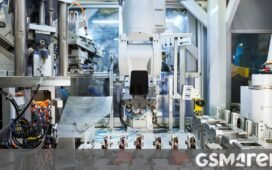AMD today revealed that it will be announcing the next generation Ryzen 9000X3D chips next month on November 7.
The Ryzen 9000X3D chips are the successor to the previous Ryzen 7000X3D chips, which included highly popular models such as the 8-core Ryzen 7 7800X3D along with the 12 and 16 core 7900X3D and the 7950X3D.

The new 9000X3D models will be based on the new AM5 architecture like other Ryzen 9000 series chips but will feature the company’s 3D V-cache technology, which includes an additional layer of L3 cache that massively improves gaming performance.
The timing for this announcement is peculiar; while the 7000X3D chips didn’t arrive until five months after the launch of the standard chips, AMD seems to have fast-tracked the launch of the 9000X3D chips to just three months after Ryzen 9000 launch back in August. This is likely the result of an underwhelming response to the 9000 series, which only made minor improvement in performance over the previous generation, that resulted in lackluster sales.
This announcement also comes mere weeks after Intel announced its next generation range of desktop processors. While Intel also isn’t claiming big leaps forward in performance over its own previous generation parts, it was at least quite upfront about it in its slides, something AMD was not. This resulted in most people seeing the Intel announcement in a favorable light while it has largely been a rough few months for AMD following the 9000 series launch, at least as far as public perception is concerned.
The hotly anticipated 9000X3D series is the company’s ticket out of the lull it’s currently in. If the rumors are correct, we may see the 8-core 9800X3D arrive first even though previously AMD released the 8-core 7800X3D model a month after the other 7000X3D parts. The 9900X3D and 9950X3D are also said to have 3D V-cache on both CCDs this time whereas the previous dual CCD models had it on just one.
As for actual performance, MSI did have some leaked slides that gave a reasonably idea of what to expect. We are essentially looking at non-X3D variant performance in productivity but much higher gaming performance. However, the leap in gaming performance over the 7000X3D chips isn’t expected to be high. Whether that would be enough to get AMD out of its current predicament or if it ends up being another 9000 series launch, we will have to wait and see.















